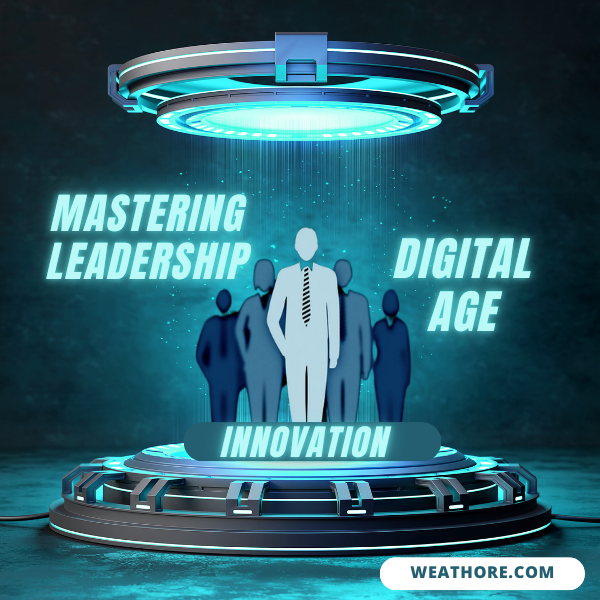How can leaders thrive in today’s fast-paced, technology-driven world? In the digital age, effective leadership is more crucial than ever for driving business success. This post will explore the key skills necessary for mastering leadership in the digital age landscape, fostering innovation, and ensuring sustainable growth.
Embracing Technological Change
In the digital age, leaders must be open to adopting new technologies. This includes understanding emerging trends and how they can be integrated into the business. For instance, leveraging data analytics can help in making informed decisions and predicting future trends. Being tech-savvy not only improves efficiency but also positions the business as a forward-thinking entity.
Key Skill: Adaptability
- Stay updated with the latest technological advancements.
- Encourage a culture of continuous learning and development.
- Invest in training programs to upskill employees.
Example: At WealthOre, we regularly conduct workshops to help our team stay ahead of the curve in terms of new technologies and tools. This not only boosts our productivity but also keeps us competitive in the market.
Visionary Thinking
Leaders need to have a clear vision for the future. This vision should align with the company’s goals and the changing dynamics of the digital market. Visionary leaders inspire their teams by setting a clear direction and articulating a compelling picture of what success looks like.
Key Skill: Strategic Planning
- Develop a clear, long-term strategy that incorporates digital transformation.
- Communicate the vision effectively to all stakeholders.
- Set achievable milestones to track progress.
Example: A CEO who integrates digital transformation into their company’s vision will likely see improved efficiencies and competitive advantages. Communicating this vision regularly keeps everyone aligned and motivated.
Fostering a Collaborative Environment
The digital age emphasizes the importance of collaboration. Leaders must create an environment where teamwork and open communication are encouraged. Digital tools like collaboration software can facilitate this by making it easier for teams to work together, regardless of their physical location.
Key Skill: Communication
- Use digital communication tools to keep the team connected.
- Encourage feedback and open dialogue.
- Recognize and reward collaborative efforts.
Example: Implementing tools like Slack or Microsoft Teams can help streamline communication and enhance collaboration among team members, especially in remote working environments.
Leading with Empathy
Empathy is a critical leadership skill in the digital age. Understanding the needs and challenges of your team helps build trust and loyalty. Empathetic leaders can better manage remote teams, ensuring that everyone feels valued and supported.
Key Skill: Emotional Intelligence
- Listen actively to your team’s concerns.
- Provide support and resources for personal and professional growth.
- Foster a work-life balance, especially in remote working environments.
Example: Regular check-ins and offering flexible work hours can go a long way in showing your team that you care about their well-being and understand their challenges.
Data-Driven Decision Making
The ability to make informed decisions based on data is a hallmark of Mastering Leadership in the Digital Age. Leaders must be able to analyze data, identify patterns, and make strategic decisions that drive business success.
Key Skill: Analytical Thinking
- Utilize data analytics tools to gather and interpret data.
- Make decisions based on data insights rather than intuition alone.
- Continuously monitor and adjust strategies based on data feedback.
Example: Using tools like Google Analytics or Tableau can provide valuable insights into customer behavior and business performance, helping leaders make more informed decisions.
Encouraging Innovation
Innovation is the lifeblood of digital-age businesses. Leaders should encourage a culture of innovation where new ideas are welcomed and explored. This can lead to the development of new products, services, or processes that can give the company a competitive edge.
Key Skill: Creativity
- Provide opportunities for brainstorming and idea-sharing.
- Allocate resources for research and development.
- Celebrate successful innovations and learn from failures.
Example: Holding regular innovation workshops or hackathons can spark creativity and lead to breakthroughs that drive the business forward.
Building a Digital-First Culture
Creating a digital-first culture means integrating digital technologies into every aspect of the business. Leaders need to champion this shift by promoting digital literacy and ensuring that all employees are comfortable using digital tools.
Key Skill: Digital Literacy
- Promote the use of digital tools and platforms.
- Offer training programs to enhance digital skills.
- Lead by example by using digital tools in your own work.
Example: Providing training sessions on new digital tools and ensuring that all employees are proficient in their use can enhance productivity and foster a culture of continuous improvement.
Managing Change
Change is constant in the digital age, and leaders must be adept at managing it. This involves guiding the organization through digital transformations, which can be disruptive but necessary for long-term success.
Key Skill: Change Management
- Develop a clear change management strategy.
- Communicate the benefits and necessity of change to the team.
- Provide support throughout the transition process.
Example: A well-communicated change management plan that includes training and support can help ease the transition and ensure that all team members are on board with the new direction.
Case Study: Successful Digital Leadership at Amazon
To illustrate the impact of Mastering Leadership in the Digital Age, let’s look at Amazon, a company that successfully navigated its digital transformation. Under the guidance of its CEO Jeff Bezos, Amazon integrated advanced data analytics into its decision-making processes, resulting in a 30% increase in operational efficiency. By fostering a collaborative environment and encouraging innovation, the company developed groundbreaking products and services like Amazon Web Services (AWS) and Alexa that captured significant market share. The Jeff Bezos’s empathetic leadership style also helped maintain high employee morale during the transition.
Conclusion
Mastering Leadership in the Digital Age requires a unique set of skills that combine traditional leadership qualities with digital savviness. By embracing technological change, fostering collaboration, leading with empathy, and encouraging innovation, leaders can drive their businesses to success in the digital landscape.
For more insights on digital transformation, check out our article at wealthore.com. Learn more about leadership skills from this Harvard Business Review article.
What leadership challenges have you faced in the digital age, and how have you overcome them? Share your experiences and insights in the comments below! Have any questions about mastering leadership in the digital age for business success? Let us know at co@wealthore.com!







